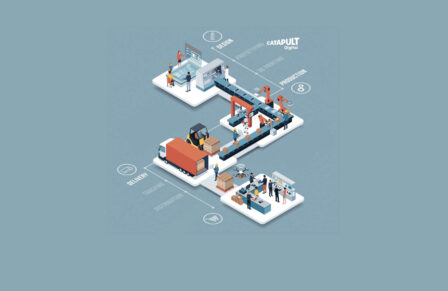The biggest business opportunities for digital tech in the chemicals industry
Posted 20 May 2022
Understanding the power of emerging technologies, and the range of roles these technologies can play in large organisations across the chemicals and materials industries to facilitate innovation and digital transformation is key. Not only are these technologies disrupting traditional ways of doing business, they are one of the most important tools for improving efficiencies, lowering costs, making business more competitive, and making the most of the vast amounts of data being collected daily.
At the recent ChemUK Expo, Digital Catapult’s Partnerships & Product Manager Rukmini Prasad interviewed Richard Head, Digital Strategy Partner at Johnson Matthey, about his company’s journey towards digital transformation.
Collaboration is critical
Rukmini and Richard had a really interesting and lively discussion about how data is essential to making informed decisions within large manufacturing organisations, and the importance of working with innovation organisations such as Digital Catapult, to access ideas and input that can provide that important external insight.
For example, Johnson Matthey was one of the organisations in Digital Catapult’s UK-India programme partnering with cutting-edge UK tech startups to develop net zero solutions for industry.
Whilst recognising that it doesn’t have all the answers, Johnson Matthey is using these important partnerships to help drive change through the creation of proof-of-concept, testing and iterating.
Share the knowledge
Richard is responsible for IT operations for Johnson Matthey and oversees the implementation of IT processes, change and data management, and talked about how the important thing is to store and properly manage all of that data that the organisation is generating, in order to put it to best use – not to keep it bundled in a warehouse somewhere in piles of paper, or on a long forgotten hard drive or server, but to encourage the sharing of data across the sector and industry to drive real change.
A shift in culture and skills
Another key point that the discussion touched on was ensuring there is a culture shift within large industrial organisations, encouraging employees to become more excited and involved with new innovation and technologies. Johnson Matthey for example is undertaking Learning & Development programmes around this at the moment.
Cultural shifts in attitude are a really important point to consider when looking to adopt digital technologies, especially if there has been a bad experience with them in the past.
The final point to highlight is about skills; Richard touched on the fact that digital transformation, implementation and change management skills are not being taught in undergraduate chemistry and technical degrees, and this is something that Johnson Matthey is aiming to rectify by teaching these critical skills to graduates and employees when they join the company, helping to future proof the workforce and instil that cultural shift from the start.
Top tips for embracing tech transformation
1. Make the most of your data
Most chemical plants continuously generate an enormous amount of data but discard most of it. Instead, managers should collect the data and interpret it to reveal ways to achieve higher yields and throughput, lower energy consumption, and more effective maintenance.
2. Track and tackle your emissions
The early stages of many chemicals and materials processes – throughout many different supply chains – are where emissions are embedded in products, so any decarbonisation efforts at these early points will have significant advantages. There are plenty of digital technologies that can help here, including Digital Catapult’s Ecometer.
3. Reduce, reuse, and improve
Finding ways to reduce waste, reduce energy usage and increase output are of real importance and have significant business benefits.
4. Consider the circular economy
What to do with ‘end of life’ materials is a significant challenge. Currently there is little confidence in second life materials and is a major barrier to them entering a circular economy.
5. Scale up the use of sustainable materials
In addition to more sustainable manufacturing processes, green energy sources such as hydrogen, solar, and other forms of microgeneration are critical for energy independence and sustainability.
If you’re interested in finding out more about Digital Catapult’s sustainability work, and our work across chemicals, materials and manufacturing, contact Dr David Pugh.



